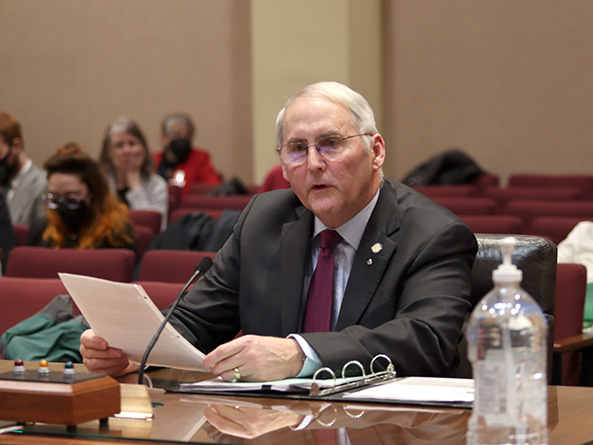Election funding restrictions considered
Private entities would be prohibited from funding elections in Nebraska under a bill considered Jan. 26 by the Government, Military and Veterans Affairs Committee.

LB858, introduced by Sen. Robert Clements of Elmwood, would require that all elections in the state be funded entirely by an appropriation from a governmental entity. The bill also would prohibit the Nebraska secretary of state, election commissioners and county clerks from soliciting, accepting or using any grants or donations from a private entity to fund an election.
Clements said he introduced the bill after learning that Facebook CEO Mark Zuckerberg donated money to local election officials to pay for the costs of the 2020 general election. He said such donations create the appearance of wrongdoing.
“It doesn’t take a very big imagination to envision billionaires of all political stripes trying to influence local election operations with conditional and private funding,” Clements said.
Deputy Secretary of State for Elections Wayne Bena testified in support of the bill. Bena said Lancaster County accepted a grant from Zuckerberg’s organization to pay for administrative costs. Acceptance of the money did not change the outcome of any race in the 2020 election, Bena said, but did create negative perceptions.
“Grants by private, third-party organizations to election administrators have the potential to raise conflict of interest questions, opportunities to have major strings attached and only be distributed to specific offices,” Bena said.
Westin Miller of Civic Nebraska testified in opposition to LB858. He said private money largely was used to purchase personal protective equipment for poll workers in Lancaster County.
“We have the receipts. The allocations are not secret; you can see exactly where they went,” Miller said.
Also opposing the bill was Danielle Conrad of the ACLU of Nebraska. She said LB858 is overly vague and could inhibit public-private partnerships.
“Philanthropy isn’t just Mark Zuckerberg,” Conrad said.
The committee took no immediate action on LB858.


